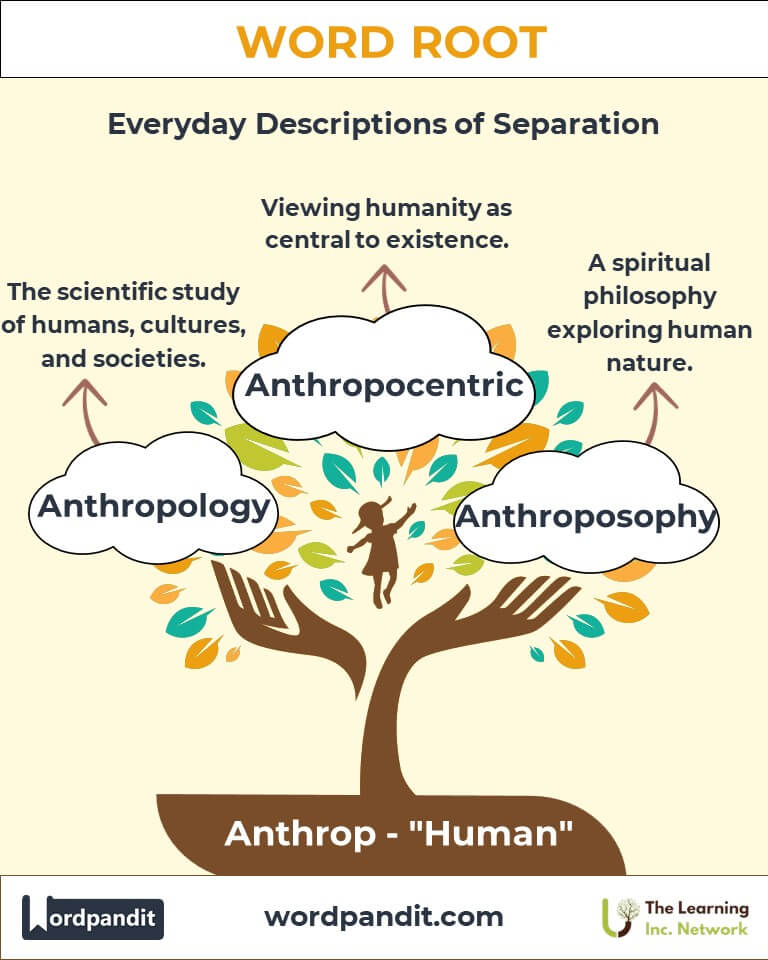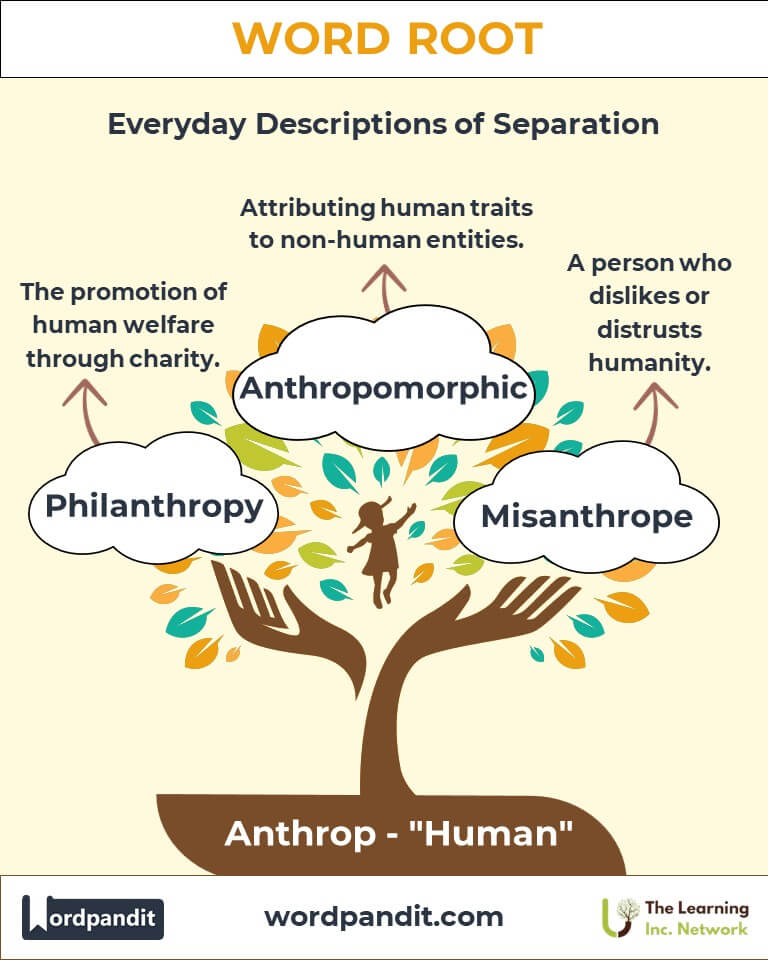Anthrop: The Root of Humanity in Language and Understanding
Delve into the essence of the root "Anthrop," derived from Greek, meaning "human." From anthropology to philanthropy, this root provides a lens to explore humanity's intellectual, cultural, and compassionate dimensions, fostering connections across fields like sociology, literature, and ethics.

Table of Contents
- Introduction: The Essence of "Anthrop"
- Etymology and Historical Journey
- Mnemonic: Unlocking the Power of "Anthrop"
- Common "Anthrop"-Related Terms
- "Anthrop" Through Time
- "Anthrop" in Specialized Fields
- Illustrative Story: "Anthrop" in Action
- Cultural Significance of "Anthrop"
- The "Anthrop" Family Tree
- FAQs about the "Anthrop" Word Root
- Test Your Knowledge: "Anthrop" Mastery Quiz
- Conclusion: The Living Legacy of "Anthrop"
Introduction: The Essence of "Anthrop"
The word root "Anthrop" embodies the vast spectrum of human nature, culture, and intellect. Pronounced as "an-throp," it stems from the Greek word "anthropos," meaning "human being" or "man." This root forms the backbone of words in fields ranging from anthropology (the study of humans) to philanthropic (love of humanity). It symbolizes an enduring quest to understand ourselves and foster compassion.

Etymology and Historical Journey
The root "Anthrop" originates from the ancient Greek "anthropos," translating to "human" or "mankind." Philosophers such as Aristotle and Plato used this term to explore human behavior and society. It entered Latin during the Roman Empire and later transitioned into English during the Renaissance. Over centuries, "Anthrop" has formed key terms reflecting humanity's evolution in thought and ethics.
Mnemonic: Unlocking the Power of "Anthrop"
Imagine a globe surrounded by diverse people holding hands, symbolizing humanity's unity. The root "Anthrop" ties all human endeavors together, reminding us that we are one species.
Mnemonic Device: "Anthrop links humans in thought, study, and kindness—our collective story."
Common "Anthrop"-Related Terms
- Anthropology (an-thruh-pol-uh-jee): The scientific study of humans, cultures, and societies. Example: "Anthropology reveals fascinating insights into ancient civilizations."
- Philanthropy (fi-lan-thruh-pee): The desire to promote the welfare of others, often expressed through charitable acts. Example: "His philanthropy funded schools in underprivileged areas."
- Misanthrope (mis-an-throhp): A person who dislikes or distrusts humanity. Example: "The misanthrope preferred solitude over social gatherings."
- Anthropomorphic (an-thruh-puh-mor-fik): Attributing human traits to non-human entities, like animals or objects. Example: "Anthropomorphic characters in cartoons make them relatable to children."
- Anthropocentric (an-thruh-puh-sen-trik): Viewing humanity as the central or most significant element of existence. Example: "Anthropocentric thinking influences environmental policies."
"Anthrop" Through Time
- Anthroposophy (Early 20th Century): Coined by Rudolf Steiner, this philosophy sought to explore spiritual insights into human nature.
- Anthropocene (Modern Era): A proposed geological epoch marked by humanity's significant impact on Earth's ecosystems.
"Anthrop" in Specialized Fields
- Sociology: Anthropology: Key in understanding social dynamics and cultural practices. Application: Study of kinship systems in indigenous tribes.
- Philosophy: Anthropocentrism: Debates human-centric ethics vs. environmental priorities. Example: Discussions on sustainable development.
- Literature: Anthropomorphism: Adds relatability in storytelling by humanizing animals or objects. Example: The fox in Aesop's fables symbolizes human cunning.
- Biology: Anthropoid: Refers to primates resembling humans. Example: Studies of anthropoid apes provide clues to human evolution.
Illustrative Story: "Anthrop" in Action
Sophia, a young anthropologist, ventured to remote islands to study disappearing tribal cultures. Her research shed light on ancient rituals and sustainable living practices. Meanwhile, her philanthropist mentor raised funds to preserve these traditions. Their shared passion for understanding and helping others underscored the profound reach of the root "Anthrop."
Cultural Significance of "Anthrop"
"Anthrop" reflects humanity’s introspection. In Greek mythology, Prometheus created humans and bestowed fire, a symbol of knowledge and progress. Modern applications, like anthropological studies and philanthropy, echo this theme of advancing humanity’s understanding and welfare.

The "Anthrop" Family Tree
- Homo (Latin: "human"): Example: Homo sapiens (modern humans).
- Philanthrop (Greek: "love of humans"): Example: Philanthropy (love expressed through charity).
- Andro (Greek: "man/male"): Example: Androgynous (possessing both male and female traits).

FAQs About the "Anthrop" Root
Q: What does "Anthrop" mean?
A: The root "Anthrop" originates from the Greek word "anthropos," meaning "human" or "mankind." It forms the basis of numerous words that pertain to humanity, such as anthropology (the study of humans) and philanthropy (love for humanity).
Q: What is anthropology, and why is it important?
A: Anthropology is the scientific study of human societies, cultures, and their development. It helps us understand how humans have evolved, adapted, and interacted with their environment over time, offering insights into both historical and contemporary issues.
Q: What does "Anthropocene" signify, and why is it relevant?
A: The Anthropocene is a proposed geological epoch that highlights the significant impact of human activities on Earth’s ecosystems and geology. It reflects discussions around environmental conservation and sustainability in the modern era.
Q: What is anthropomorphism, and where is it commonly used?
A: Anthropomorphism is the attribution of human characteristics to non-human entities, such as animals or objects. It is common in children’s stories, animations, and even religious texts to simplify abstract concepts and create emotional connections.
Q: What is the difference between philanthropy and misanthropy?
A: Philanthropy derives from the root "Anthrop" combined with "phil," meaning "love," and signifies promoting human welfare through generosity and compassion. Conversely, misanthropy combines "Anthrop" with "mis," meaning "hatred," and refers to a deep distrust or dislike of humanity.
Test Your Knowledge: Anthrop Mastery Quiz
1. What does "Misanthrope" mean?
2. What does "Philanthropy" mean?
3. Which word describes the study of humans?
4. What is anthropomorphism?
5. What does the root "Anthrop" signify?
Conclusion: The Living Legacy of "Anthrop"
The root "Anthrop" invites us to explore our humanity, from our cultural practices to ethical principles. It bridges disciplines, fostering empathy, understanding, and innovation. As we continue to shape our collective future, the essence of "Anthrop" reminds us of our shared human journey. Let this root inspire you to learn, connect, and contribute meaningfully to the world.














